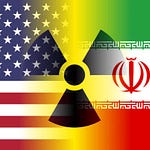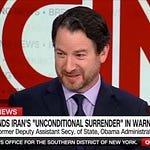The Briefing Book is fully reader-supported. We have much more in the pipeline and to make it happen, depend on your support. Please consider becoming a paid subscriber.
As Israeli Prime Minister Bibi Netanyahu visits Washington, fresh off the heels of a successful military campaign against Iran’s nuclear program that drew in American military support, a big question hovers over the visit:
Is this the beginning of the end of the Gaza war?
There’s a lot of anticipation about this visit, perhaps more than normal. The first time that Netanyahu visited President Trump in the Oval Office this term, in early February, Trump announced a plan to turn Gaza into a fantasyland, a.k.a. Gaza on the Riviera. That plan has, predictably, gone nowhere, although some ministers in Netanyahu’s coalition hope that it will.
The second time he visited, in early April, it appeared to be a rushed meeting, on the heels of Trump’s call for “Liberation Day” tariffs that harmed Israel’s economy. Netanyahu appeared to leave the meetings empty handed on tariff relief as well as doubtful about whether the U.S. would support Israeli military action against Iran’s nuclear program.
My how times have changed.
So now, as Netanyahu meets with Trump again, there are rumblings that a 60-day ceasefire between Israel and Hamas may be in the pipeline. Trump’s Mideast envoy Steve Witkoff has been pushing for it, our Qatari and Egyptian allies are leaning in, and the Israeli people are past ready to see their hostages come home. And with the Iran action at his back, President Trump seems eager to get a deal done.
But if a temporary ceasefire deal is done, there still are some thorny issues that will likely be unresolved, such as:
What will be the final role for Hamas in Gaza? If it remains in power, that may very well be a strategic loss for Israel, who, after nearly two years of fighting, would still not fully dislodge the terrorist organization.
Will a ceasefire bring in regional players to create a pathway to longer term peace in the Gaza Strip? If our Gulf allies, amongst others, are empowered to help rebuild Gaza, will that be the foundation of a new political reality there? Will this lay the foundation for a Palestinian state?
What impact will a ceasefire have on internal Israeli politics? The day of reckoning - and accountability - has not yet come for P.M. Netanyahu and his management of the pre-October 7th security failure. President Trump is trying to help him out at home politically, calling for the corruption investigation into Netanyahu to stop. Will Bibi hang on?
How will the region react? Could a ceasefire deal be the precursor to a further detente with the new Syrian government? Will the Trump team rally other countries to join the Abraham Accords and expand regional peace with Israel?
And of course, Iran. Now that the rubicon has been crossed and Israel and Iran have fought openly, fiercely, and directly - and America has intervened - what will it take to get the Iranians back to the negotiating table so that we can lock in the gains made by the strikes against Iran’s nuclear program, which set it back significantly?
Let’s be clear: It’s not acceptable that Hamas remains in power. This is a terrorist organization that has brought misery not only to Israel but also to the people of Gaza.
At the same time, a ceasefire deal that brings home all of the hostages is morally urgent and strategically necessary. Most Israelis know this. Despite the ongoing trauma and devastation, they are signaling that they are willing to make hard compromises to get their loved ones back.
That’s why the post-ceasefire “day after” strategy matters so much. It’s not enough to just stop the fighting. We need a plan. A real plan.
A plan that removes Hamas from power - not just militarily, but politically.
A plan that fills the governance vacuum in Gaza with legitimate Palestinian leadership, backed by the Arab world and the international community.
A plan that restores Israeli security - not through reoccupation, but through diplomacy, deterrence, and regional cooperation.
A plan that revives a credible pathway toward a two-state solution. This is because there is no long term military solution to this conflict. Only diplomacy will deliver lasting peace.
If there’s to be a ceasefire, it must be more than just a pause. It must be the start of a transformation.
Hamas must not regain power. The hostages must come home. The guns must go silent. But the work must not stop there. It’s time for a new approach - one that dares to imagine peace, and fights just as hard to make it real.
Trump and Netanyahu must therefore go beyond short term deals. They must embrace a vision for the Palestinians rooted in nation-building that will provide Israelis with security and be accomplished in partnership with both the Palestinians and the wider region.
That’s what real leadership demands.













Share this post